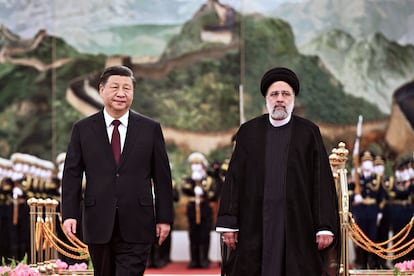Iran and China strengthen ties amid tensions with Washington
Beijing imposes sanctions on US companies for selling military equipment to Taiwan following the surveillance balloon incident


In the aftermath of the balloon flap, China wants to make a statement – it has powerful friends. At the end of Iranian President Ebrahim Raisi’s recent three-day trip to Beijing, during which he met with President Xi Jinping, both heads of state reiterated their intention to “develop a close strategic relationship.” They also called for lifting the sanctions on Iran and restarting stalled denuclearization talks.
President Xi formally accepted an invitation to travel to Iran, according to a joint statement by both countries; the last time he visited was in 2016. Beijing recently seems fixated on the strategic but volatile region. One of Xi’s first foreign outings after three years of the pandemic was to Saudi Arabia, Iran’s principal regional rival. His objective – extend relations with an eye to its abundant hydrocarbons. The Middle East is a crucial link in China’s ambitious New Silk Road initiative, launched almost a decade ago, which aims to connect the country more closely with the rest of the world through infrastructure development programs.
Xi and Raisi have decried Washington’s unilateral abandonment of the Joint Comprehensive Plan of Action (JCPOA), the nuclear agreement Iran signed in 2015 with China, the United States, Russia, the United Kingdom, France, Germany and the European Union. The pact obliges Iran to drastically curtail its nuclear program in exchange for economic incentives.
Former president Donald Trump pulled the United States out of the deal in 2018 and reimposed sanctions against Iran. Since then, the European Union has unsuccessfully tried to revive the agreement. “All relevant sanctions must be lifted completely and verifiably, and the JCPOA must be fully and effectively implemented,” demanded Beijing and Tehran.
A rejection of the Western notion of human rights
Both countries have similar views on several topics, such as their rejection of the Western notion of human rights. This is a sensitive issue for China and Iran. The United Nations believes China’s repression of its Uyghur minority may constitute crimes against humanity. According to Iran Human Rights, a watchdog NGO, Iran’s violent quashing of the recent widespread protests may have caused 500 deaths.
The two countries have another way of looking at things. “On the issue of human rights, both sides noted that countries have diverse domestic conditions, historical cultures, social systems and levels of economic and social development,” said the joint statement.
Raisi’s state visit to China coincided with the storm raging since early February over the suspected surveillance balloon incident. In retaliation for the US shootdown of the balloon, China sanctioned two US companies – Lockheed Martin Corporation and Raytheon Missiles & Defense – for “participating in the sale of arms” to Taiwan, according to a statement issued by the Chinese Ministry of Commerce. Beijing claims Taiwan, a US-supported, self-governed island, as Chinese territory.
China’s move against Lockheed Martin and Raytheon is the latest tit-for-tat response to the US blacklisting of five companies and a research institute in China allegedly connected to military surveillance aircraft programs.
According to the statement, the sanctions taken to “safeguard national sovereignty and security” mean that both companies will be banned from importing or exporting to mainland China. They are prohibited from making new investments in the country, company executives will not be allowed to enter Chinese territory, and fines will be imposed.
The current tensions began in early February when a Chinese stratospheric balloon was detected over US territory. Washington accused Beijing of using it for espionage and shot it down after it had crossed the entire country. China protested, saying it was an unmanned aircraft used for “meteorological research” that veered off course. The Chinese government says similar American aircraft have intruded into Chinese airspace 10 times over the past year.
The incident led US Secretary of State Antony Blinken to postpone a February 5-6 official visit to China. He was expected to meet with Wang Yi, China’s highest-ranking diplomat. Wang is currently in Europe, where he plans to visit France, Italy, Hungary and Russia. Blinken and Wang are among the world leaders scheduled to attend the Munich Security Conference this weekend.
Sign up for our weekly newsletter to get more English-language news coverage from EL PAÍS USA Edition
Tu suscripción se está usando en otro dispositivo
¿Quieres añadir otro usuario a tu suscripción?
Si continúas leyendo en este dispositivo, no se podrá leer en el otro.
FlechaTu suscripción se está usando en otro dispositivo y solo puedes acceder a EL PAÍS desde un dispositivo a la vez.
Si quieres compartir tu cuenta, cambia tu suscripción a la modalidad Premium, así podrás añadir otro usuario. Cada uno accederá con su propia cuenta de email, lo que os permitirá personalizar vuestra experiencia en EL PAÍS.
¿Tienes una suscripción de empresa? Accede aquí para contratar más cuentas.
En el caso de no saber quién está usando tu cuenta, te recomendamos cambiar tu contraseña aquí.
Si decides continuar compartiendo tu cuenta, este mensaje se mostrará en tu dispositivo y en el de la otra persona que está usando tu cuenta de forma indefinida, afectando a tu experiencia de lectura. Puedes consultar aquí los términos y condiciones de la suscripción digital.








































